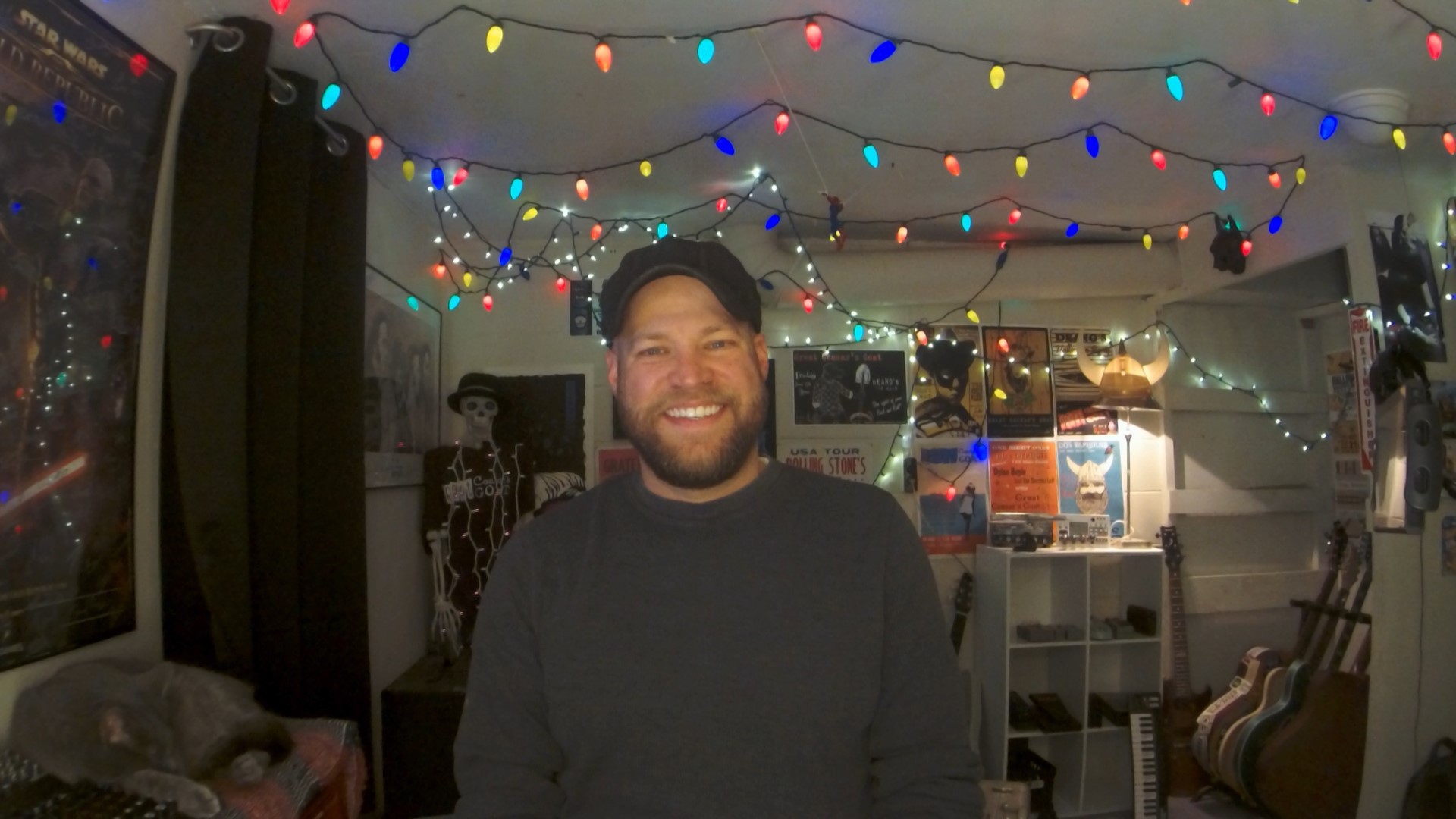Five questions with a virtual meeting technical moderator
Author: Dave Roepke
This is an archived story. The content, links and information may have changed since the publication date.
Author: Dave Roepke

Audio visual support specialist Spencer Braly has taken on a new role during the pandemic, providing technical support to high-profile virtual meetings while working from his basement lit by Christmas lights. Photo by Spencer Braly.
During the COVID-19 pandemic, virtual meetings have changed how many Iowa State faculty and staff do their jobs. Same goes for Spencer Braly, though in his case it's changed both how he works and what he does.
Braly, an audio visual support specialist with information technology services, provides behind-the-scenes technical support for most of the university's highest-profile online events, including the town halls held by President Wendy Wintersteen and the commencement ceremonies for spring and fall. Providing white-glove support for ISU virtual events and meetings has quickly taken over much of his work time and the basement of his Ames home, a space adorned by ceiling Christmas lights that had been devoted to recording with his band.
His setup for facilitating virtual meetings includes four screens, two computers, two mixers, two routers, an audio interface box and a switch for toggling his keyboard and mouse between the computers, but he still has room to record music when the work day is over, albeit for a solo project.
"That's what I do to relax. I don't leave the basement, I just switch which programs I'm running," Braly said.
Inside caught up with Braly for five questions about his work supporting virtual meetings.
My main focus day in and day out was support, design and programming for learning spaces. If something went awry with an AV system in a classroom, there's a good chance I was the guy showing up to see if I could get it working again. Classrooms were the game. I still do a little bit of it. The way our systems are set up, I can troubleshoot from afar rather effectively. We still have guys on the ground, but I help with the day-to-day as much as I can. But more than half of my job has become these virtual meetings.
The term that I've been using is technical moderation. Basically, I set it up, and if something goes disastrously wrong, you've got a guy there who can get it back on track or knows the person to call to get it there. You might not need me every time, but when you do, you're glad I'm there. I've done all the president's town halls except for the first one. I do the Flagship Fridays. I do a lot of others, like the president's council. Today, I did the Board of Regents.
One of the things we had to figure out early on was that all of our Webex platforms are capped at 1,000 people. We needed a way to take a Webex meeting and let more than 1,000 people watch it. Webex has now integrated streaming to platforms like YouTube, so you can just do it from inside the meeting. But when all this started, this hadn't been introduced. That first town hall I did, for the whole meeting I was about five minutes from everything falling apart.
Now, my problems are this person can't get into the meeting, we're last minute adding this, and they don't know how to do that. A big thing has been playing videos for people and formatting it so it looks the best. Babysitting the mutes is a small part. Everybody's heard the typing noise in a meeting when someone forgets to turn their microphone off. I'm the guy in the background listening for that. Or if I see somebody start to talk, I can get them unmuted before somebody says "You're muted." I'm making sure no one has to worry about the meeting because I'm the one doing all the worrying.
I have two services now. And I live alone. That helps. I don't have other people on the internet when I'm trying to host a meeting. At first, I upgraded my service. Now, I'm running two services. One runs just on Wi-Fi. The other one is wired to my desk. If the wired connection goes out, I can just flip over to Wi-Fi, and I'm all good. It was the derecho that got me thinking I should have some redundancy.
I think people have become more conscientious. There's a lot fewer microphones being left on. There's a lot less drifting away from the meeting, where you can tell someone just heard their name and then snapped back. You can tell everyone's getting used to paying attention, being more conscious of being virtually there just as they would be in person.
I can see that whenever we get to a post-COVID world, we're not going to completely stop doing this. I think everybody's gotten a taste of it, and we're going to have a shift in how we do some large events. I'm not saying they're all going to go this way. The president's annual address will probably go back to being in the Great Hall. But I think it's gotten in people's heads that if we do this virtually, we don't have to book the big room, get the catering or fly the person in to speak. They can do it from their bedroom, I can do it from my bedroom and everybody can still get the information.